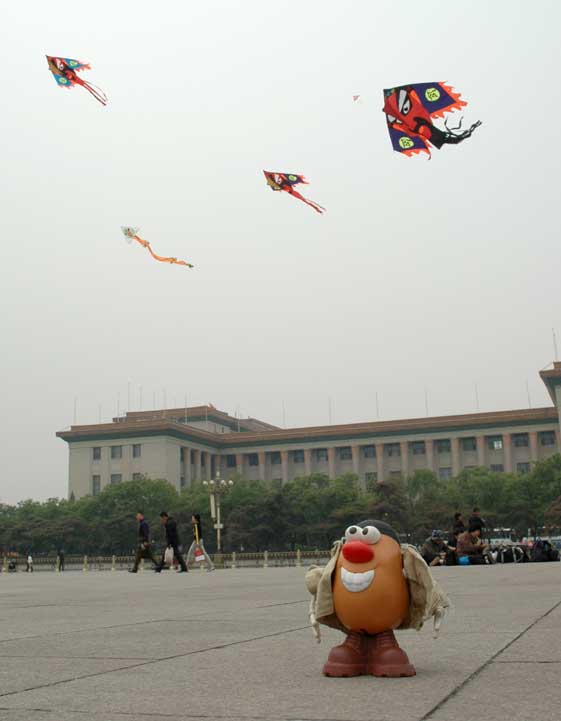
![]()
When Spud found himself in Hong Kong, he could not resist the temptation to travel to the mainland of China to see the place where practically everything the potato owns was made.
Where better to get a good glimpse into the cultural heart of China than from Beijing. Spud had visited many old cities over the years, but all pale in comparison to the age and history of the Chinese capital. In fact, the first Neolithic villages appeared in the area as far back as 3000 B.C. Over the years, Beijing became a major trading centre and assumed the role of the capital for many Empires during China's dynasties. Today it is in the midst of an economic and cultural reform as China begins its growth as an economic powerhouse.
Nowhere was this more evident than at Beijing's famous Tian'anmen Square; Spud's first stop in the city. The immense 120 acre (50 hectare) square was completed in 1959 under order of Chairman Mao Zedong (AKA Mao Tse-Tung), to commemorate the 10th anniversary of the Communist rule of the People's Republic of China. Over the years, the square has been the scene of many demonstrations including the tragic events of 1989 when protests against corruption and a call for democratic reform ended in violence.
Thankfully, there were no protests being held when Spud arrived, but the Square was still bristling with activity. China's effort to open its doors to the world have led to Capitalism and Entrepeneurship at its finest. Within minutes of arriving at the square, Spud was mobbed by locals aggressively pushing their wares on the shell shocked potato. Whether you were in the market for postcards, pins, souvenir books, kites or a genuine imitation Rolex, your needs could be met by seemingly hundreds of salesmen whose jacket pockets double as display cases.
Aside from aggressive salesmanship, Spud learned that many of the people of Beijing take 'hawking' to a new level. In fact, Spud was convinced that Beijing must be the world's largest producer of phlegm. So proud of their skills in production, virtually everyone - young & old, women or men, are eager to produce it at will and deposit it on the street to share with all. Gives new meaning to the term 'Gross Domestic Product'
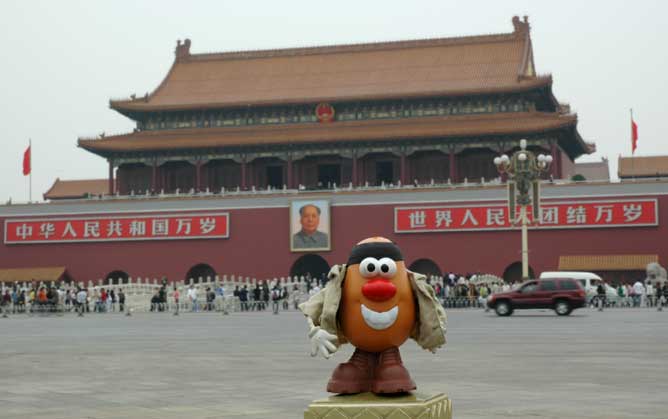 A
high ranking government official pushed his way through the crowd to the
potato. The man reached down, scooped up the side dish and whisked him
away.
A
high ranking government official pushed his way through the crowd to the
potato. The man reached down, scooped up the side dish and whisked him
away.
The mysterious man informed the potato that he was invited to the Imperial Palace as a matter of national urgency.
The Imperial Palace was located in the ancient Forbidden City; a series of grand, strategically positioned structures that were built in the early 15th century during the Ming Dynasty, as a home for the Son of Heaven.
The Forbidden City was a sprawling complex completely surrounded by a moat and enormous red walls. Spud's tour book said that the walls were to separate the elite and their servants (which were house inside) from the everyday 'ordinary' people. Spud figured it was more likely to keep out the proliferation of postcard pushers.
The man led Spud across the Golden Bridge to Tian'anmen Gate where a 20 X 15 foot (6 x 4.5 metre) portrait of Mao Zedong marked the separation between the old world (the Forbidden City) and the new world (modern Beijing).
Inside the Imperial Palace, Spud was ushered to the Hall of Preserving Harmony, where he met with a group of frantic officials. A silver haired man with a long pointed beard, stood and told the potato that the country was under siege and that a warring tribe of foul smelling nomadic Mongols were planning to attack and overthrow the regime.
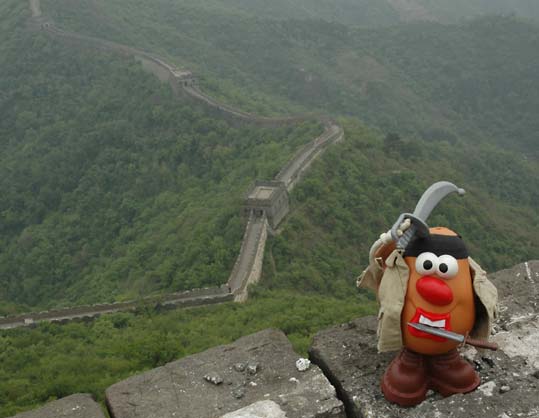 The
man pleaded for the potato's help, which the tater humbly obliged.
The
man pleaded for the potato's help, which the tater humbly obliged.
The tato was informed that the radicals were approaching the Great Wall at Mutinayu, so his greatest chance of defeating them would be to meet them head on at the ancient stronghold.
Spud made a quick stop in Beijing's Hutong district to pick up some weaponry. The Hutong was one of the original settlements in Beijing, and is a labyrinth of ramshackle homes and courtyards tied together by a maze of alleyways. The Hutong markets offered practically anything you could want, and the antique dealers did not disappoint. After paying a few yuan for an old battle sword and dagger the potato hailed down a rickshaw and made his way out to Mutianyu.
The very sight of the Great Wall stopped Spud in his tracks.
Construction originally started in 220 BC, lasted over 2 centuries and spanned ~2500 miles (~4000 km) in length, It was intended to prevent the invasion nomadic tribes from Central Asia. The cost in resources and human life to build the defense was immense. In the end, it served little purpose as the Mongols, led by Genghis Khan and later Kublai Khan, simply went around it.
Spud scaled the wall and climbed in to one of its fortress watchtowers where he could survey the mountainous terrain.
The tuber's nose found the bedraggled barbarians before he saw them. The stench of their sweaty fur-lined robes had offended everything in their path. Even the marauders' horses had abandoned them; preferring the smell of their own 'fertilizer' to the nose-burning stink of their riders.
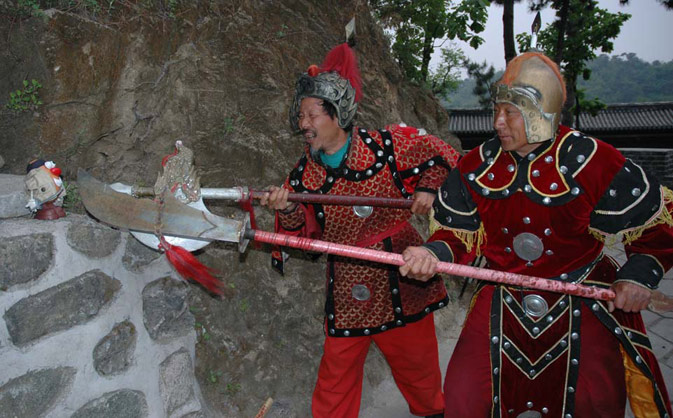 The
tater readied his sword for battle as two of the hygienically challenged
heathens approached; their weapons drawn. Spud shouted that China's regime
would not be overthrown if he had anything to say about it!
The
tater readied his sword for battle as two of the hygienically challenged
heathens approached; their weapons drawn. Spud shouted that China's regime
would not be overthrown if he had anything to say about it!
The two villains looked puzzled at each other. "We're not trying to overthrow anyone - we've come to learn the Ancient Chinese Secret for getting clothes clean and fresh"
Spud dropped his sword and called down to a Vendor in a stall near the souvenir stands. Moments later, the vendor appeared with a few cases of Calgon laundry detergent.
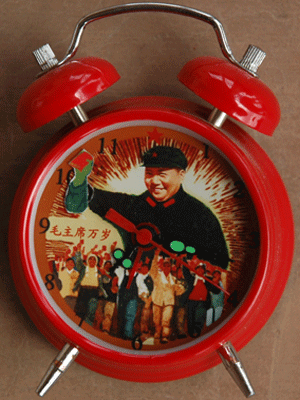 The
potato offered the soap to the rank rampagers who were relieved to finally
have learned the Ancient Chinese Secret. The tribe climbed over the wall
and began the long journey back to their villages in the North; happy
to know that Ring around the Collar would soon be a thing of the past.
The
potato offered the soap to the rank rampagers who were relieved to finally
have learned the Ancient Chinese Secret. The tribe climbed over the wall
and began the long journey back to their villages in the North; happy
to know that Ring around the Collar would soon be a thing of the past.
The Chinese government was elated at the Potato's great victory and showered the side dish with praise and accolades. At a special ceremony back at Tian'anmen Square, Spud was awarded China's highest prize: a Chairman Mao Twin-bell alarm clock